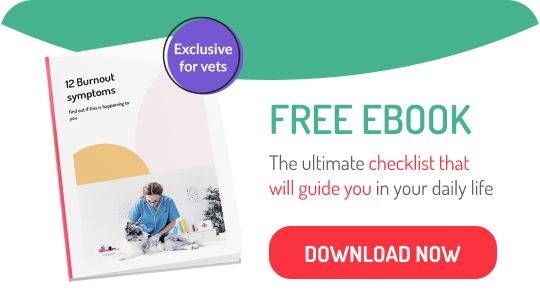There are two types of stress: good stress and bad stress. A little bit of pressure improves concentration and problem-solving skills, but excessive and prolonged stress leads to burnout. Find out how to manage it so that it’s beneficial in your life and in your work at the Veterinary Clinic.
Living with a certain amount of stress stimulates adrenaline and gives us a boost in our daily activities. Adrenaline, as we know, is released in situations of alarm, stress, fear, danger or excitement. It helps us to cope with such situations and is a defence mechanism for survival, as it increases physical performance and sharpens the senses.
In ancient times when we lived in caves, without that adrenaline rush and the reactions it causes in the body we would not have survived and you would not be reading this post. The question is, do we need stress today?
A little stress is good for increasing concentration and improving productivity.
Of course it is. As a veterinarian or assistant, without this little bit of stress, you probably wouldn’t get all your work done on time or you wouldn’t have all five senses focussed on the case at hand. It improves your ability to react, concentrate and perform.
Consequences of living with permanent stress

Nevertheless, excessive stress and its persistence over time are counterproductive. Everyone reacts differently to stress: what’s a healthy level of tension for some people can turn into excessive pressure for others.
A permanent state of alertness, as if we have to save ourselves from imminent danger, has serious consequences both physically and mentally.
On the physical level, high levels of adrenaline and cortisol disrupt the hypothalamic-pituitary axes and, at the very least, cholesterol, triglycerides, blood pressure and sugar metabolism.
The alteration of the immune response can also increase diseases with a strong inflammatory component, such as asthma, intolerances and allergies, or even make us more sensitive to respiratory viruses.
The sustained increase of cortisol in the blood also limits decision-making in the long run, affects memory, accelerates cellular ageing, and a laundry list of other negative effects.
Persistent stress causes physical and psychological ailments that can lead to burnout.
On a mental level, it can cause an inability to concentrate, difficulty in maintaining focus, frequent forgetfulness, hypersensitivity to criticism, bad moods, inability to make decisions or greater susceptibility to accidents. And all this, in the end, can lead to burnout.
Moreover, stress is “contagious”. Even if you wake up in a good mood and are determined to be relaxed no matter what happens at the Clinic, if there is a lot of adrenaline in your environment, it will be very difficult to escape the nerves and general irritability, won’t it?
How do you manage stress in your everyday life in the veterinary profession?
First of all, we recommend that you analyse the situations that cause you stress. Perhaps a difficult conversation with a client? Take a few deep breaths, take a five-minute break or take a quick walk for a change of scenery. If you are about to have a conversation that makes you uncomfortable, take a deep breath and equip yourself mentally and emotionally for it.
Learning to manage your time, improving resilience, relaxation techniques and “unwinding” are all techniques to improve stress.
Learn how to manage stress

Learning techniques to help you manage stress will help you stay calm no matter how out of control things get around you. What can you do?
- Improve your problem-solving skills — prioritise the most important tasks and improve time management. Learn to delegate!
- Improve your resilience. In the article “7 tips to boost resilience in Vets and Vet Techs when facing stress” you will find some tips on how to become stronger emotionally.
- Practice relaxation techniques such as deep breathing, yoga, meditation, sport or even prayer if it helps. In the BodyVet section you will find VetYogi: guided meditation, yoga and breathing exercises developed by a certified yoga and breathing instructor who is also a veterinarian – Dr. Cris Pestana – with specific series to prevent the most common physical (and mental) injuries among veterinary professionals.
- Improve your social life. Going out and having fun will relax you and help you to switch off and forget about the problems of the clinic. And play with your pet or the little ones in the family!
- Take time for yourself, even if it’s just a 15-minute walk alone (best if it’s outdoors in nature) or take up a hobby that you’re passionate about and helps you take your mind off things.
Winning the battle against stress is possible, the answer lies in you and how you safeguard yourself to find the right balance.
References:
- Aschbacher K, O’Donovan A, Wolkowitz OM, Dhabhar FS, Su Y, Epel E. Good stress, bad stress and oxidative stress: insights from anticipatory cortisol reactivity. Psychoneuroendocrinology. 2013;38(9):1698-1708. doi:10.1016/j.psyneuen.2013.02.004
- Types of Stressors (Eustress vs. Distress), en MentalHelp.net https://www.mentalhelp.net/stress/types-of-stressors-eustress-vs-distress/
- Stress symptoms: Effects on your body and behavior, en Mayo Clinic.org. https://www.mayoclinic.org/healthy-lifestyle/stress-management/in-depth/stress-symptoms/art-20050987
- Stress management for veterinarians, en AVMA https://www.avma.org/resources-tools/wellbeing/stress-management-veterinarians









